| Reviews & Columns |
|
Reviews DVD TV on DVD Blu-ray 4K UHD International DVDs In Theaters Reviews by Studio Video Games Features Collector Series DVDs Easter Egg Database Interviews DVD Talk Radio Feature Articles Columns Anime Talk DVD Savant Horror DVDs The M.O.D. Squad Art House HD Talk Silent DVD
|
DVD Talk Forum |
|
|
| Resources |
|
DVD Price Search Customer Service #'s RCE Info Links |
|
Columns
|
|
|
Making Plans for Lena
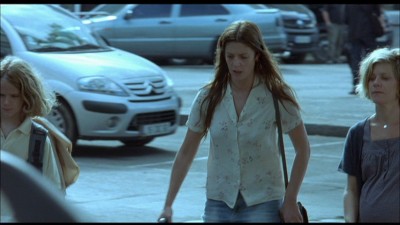
I love a challenging, rich, not readily comprehensible movie (I'll go on at length about what flat-out great, important films Persona or Au Hasard Balthazar are), and I love movies about difficult characters who are hard to "like" (I've always had a hard time with measuring a movie by the "likeability" of its characters; it's much more important that the film lets us really see and understand them, likeable or not). I say this lest anyone infer from my nonplussed impression of Christophe Honoré's Making Plans for Lena that I was unimpressed because confounded by its meandering quality (I love digressive movies, truly digressive movies, too; Godard's abruptly leaping Weekend is just about a perfect picture), or put off because its main character -- the Lena of the title, who more or less rejects her ex-husband, her nice and well-meaning bourgeois family, and her own children, all after being a long-standing thorn in all of their sides -- is a distraught, indecisive, out of control person who habitually undermines herself and usually behaves in a way markedly less than noble or constructive. No, any of those things could be parlayed into something much more engaging and accomplished than Honoré's film. What niggles about this desultorily put together mess of a movie is that its appearances are fairly egregiously deceptive; it ends up proving that if there's anything worse than a flat-out conventional, dull-minded movie with nothing to say, it's a movie with very little to say that, through its style and narrative approach, behaves at every turn as if what it's doing is of tremendous importance, worth any unearned but easily whipped up art-film trapping that can be haphazardly superimposed onto its rickety scaffold.
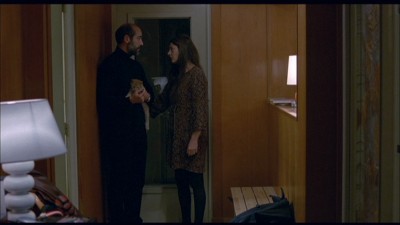
It all begins with the handheld/breathless camera and perhaps cool-looking but unnecessary cut-ins of the opening sequence, when we meet Lena and her two children as they race through a busy station, trying to make the train that will take them to Lena's parents' (Marie-Christine Barrault, the golden-haired wife in Rohmer's My Night at Maude's, and Fred Ulysse) rustic country dwelling in Brittany. The already addled and panicky Lena (Honoré gives her three unpredictably alternating moods: distraught, put-upon, and pensive) is in the process of running away from her handsome, cheating American-expat husband, Nigel (Jean-Marc Barr, Europa) and her job as an anesthesiologist, throwing an old, painfully suffocating life away to start a new, as-yet-undetermined one. Back at home, she has to deal not only with her parents -- not so much her blasé dad as her sweet-faced but domineering mother (she's the one the title refers to, the one making the plans, much to Lena's resentful chagrin) -- but also with her inappropriate brother, Gulvet (a hammy Julien Honoré, the director's brother), who still lives with the folks, now with a goofy new fiancée in tow, and her pregnant sister, Frédérique (Marian Foïs, Four Lovers), a driven, responsible, but rather hardened and neurotic career woman who's now been unwillingly recruited to hook Lena up with some stopgap job and who can't stop finding fault with the disarrayed life of her self-involved, self-pitying older sister. As one more in a life-long series of acts of subterfuge, Lena's mother has taken the trouble to invite ex-hubby Nigel out to their house, too, leaving the squabbling siblings and fractured couple to stew in their own tense juices. This simmering pot of dysfunction simmers over the course of the film; by the time it comes to a boil, Lena has drifted to the edge and climbs out, circumstances having forced her to make the tie-cutting, family-divesting choice she reasonably should have made for herself long ago.
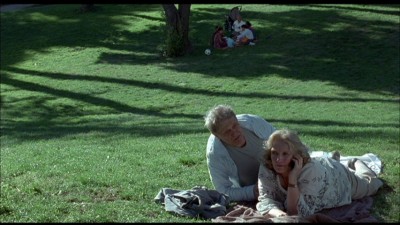
With his lackadaisical pacing; distracted jumping from one relationship to another and haphazard introductions of memories and people from Lena's past (including Simon, her wannabe lover, played by The Dreamers's Louis Garrel); let's-see-where-this-goes plotting; and alternation of lingering, languorous camera with too-rapid, frazzled-feeling editing, Honoré seems to think he's Robert Altman or Bob Rafaelson. Or he wants to be Bergman: An incisive observation of complex and unraveling relationships between lovers, mothers, brothers, and sisters against the backdrop of a privileged life is something the Swedish master attempted many times, always with much more success than Honoré attains here. Neither Honoré's plans nor his a filmmaking sensibilities seem to have as much at stake as those distinguished filmmakers' work, in which the remarkable stylistic choices that exhilarate and impress come as the end result of much creative struggle and carefully-made, painstaking choices in service of a vision that's become exceedingly well-defined (however loose or patient the style) by the time it's made its way to the screen. Honoré seems to have only studied the surface of his role models' work and then rushed ill-advisedly ahead, overeager for an unearned tone of daring and gravity that little in his story seems to support. A great deal of Making Plans for Lena consists of awkward symbolism (e.g., the rescued injured bird at the train station in the beginning); unmotivated postcard views of the family's beautiful old country home or Britanny's stunning countryside; or lurching, naturalistically shot but stagily performed, overdetermined conversations/arguments that are supposed to be painful and revelatory but instead come off as textbook behavioral demonstrations. Sometimes, there's just strangely bad writing, as when the sibling rivalry between Lena and Frédérique is apparently meant to be rounded out on a nonchalant final beat up by the latter's announcing to everyone in the room, apropos of nothing and contrary to everything that's come before, "I love my sister!"
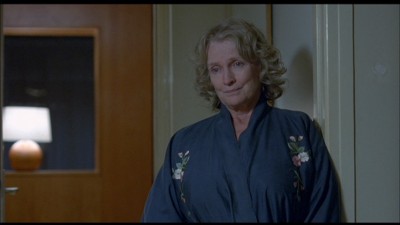
Almost all of it -- even, when it comes down to it, the nicely designed and edited photo-album montages of the family's past, or the intriguing and well-played audacity of seguing from a story of long-ago France Lena's son is telling her into a full onscreen depiction of that story that becomes a mini movie-within-the-movie (a sudden break in the flow that makes us do an impressed double-take only to gradually let us down as we realize it's just more blah, over-obvious symbolism) -- is pretty but pointless pictures, carts put before the horse, finely done cinematography (by Laurent Brunet, whose plentiful talents served something higher in Mahamat-Saleh Haroun's A Screaming Man), stylistic flourishes that miss any clear sense of what the characters are doing, what significance or truth there might be to it, or why Honoré is telling this story in the first place. With all the superficial and transparent narrative and aesthetic gestures, and only gestures, toward grand artistic seriousness on display in Making Plans for Lena, one suspects that an externally-motivated desire to be crowned an artiste and celebrated as such might have something to do with it (that means that Honoré's more convincing talent for working with his gifted and skilled actors to create light or flat-out comedic moments gets frustratingly short shrift; that kind of thing, though at least as difficult to work up and sustain as sprawling dead-seriousness, does not tend to announce its ostensible importance so showily). But real artistes have something deeper inside, some desperate need or inspiration or overwhelming urge, that drives them; whether they end up with accolades and awards or not, the reward is not so much the fawning regard of would-be sophisticates, but work that does just justice to and retains at least some of the urgency inflicted by what was burning in them when they got the crazy idea of making it.
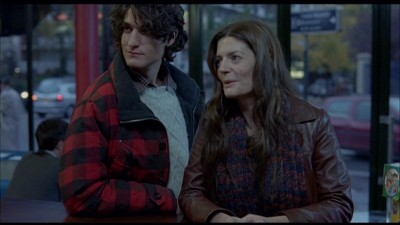
Making Plans for Lena most often feels like the cinematic equivalent of that person we've all known (or, ahem, have perhaps even been ourselves at some point, which makes the recognition of it in someone else even more embarrassing) who has a newly acquired, convolutedly "sophisticated" vocabulary and can't wait to show it off, yet has only the most tenuous grasp on what the unfamiliar, fancy-sounding words actually mean. The film struts and preens, full of chic, self-regarding art-film moves, but you simply can't fake the rarefied depth, boldness, and astuteness with which it's attempting to adorn itself via shortcuts, trying to buy off the rack what can only work if cut and tailored from whole cloth to well-considered and exacting specifications. The word "pretentious" has been so overused, and so often misused to describe films or books or music that I find wholly and exaltedly successful, that I've come to loathe it as a lazily derisive synonym for "challenging" or "ambitious," and almost always avoid using it. But it does have a real meaning, which is more or less that the emperor has no clothes -- that the highfalutin tone and trappings and superficial behaviors of someone or something simply cannot disguise, to anyone with discernment, the fact that its reach exceeds its grasp. To that end, it's not only justified but actually called for to refer to Making Plans for Lena as what it is: not an out-and-out, unwatchable, incompetent failure by any stretch, but a film whose pretentions are so many and so persistent that they render it dull, top-heavily clumsy, and faintly ridiculous.
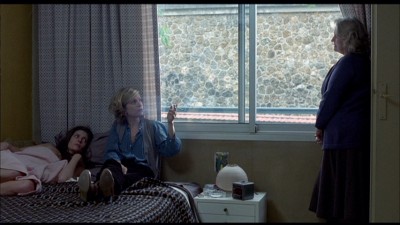
THE DVD:
The transfer here presents the film at its original theatrical aspect ratio of 1.85:1. The picture quality is hit-or-miss but overall good and stable: There appear to be off-and-on problems with artificially over-smoothing DNR (digital noise reduction) and its evil twin, edge enhancement/haloing effects around edges, as well as a few rare instances of aliasing and an overall slightly dull look that doesn't give us an experience as immediately cinematic as the best transfers do. Still, it's a perfectly watchable edition in which the film's visual qualities are appreciable enough, if not to the extent that they might've been.
Sound:The Dolby Digital 5.1 surround track (in French with non-optional English subtitles) is clear and vivid throughout, with no distortion or imbalance at any point; all music, dialogue, and ambient sound has a full, round immediacy of presence that take good advantage of the DVD's sound capabilities.
Extras:Nothing except for the film's U.S. theatrical trailer.
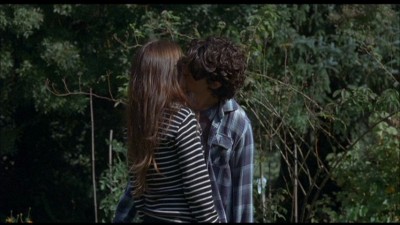
Despite a number of good performances and at least a superficial aura of deep-thinking lyricism and aesthetic adventurousness, Making Plans for Lena is quite a bit less than the sum of its parts -- an enervated hodgepodge of art-film dramatic/narrative tropes and ways of shooting that often feels strangely rushed through, as if we're being distracted from the film's deficiencies by a high turnover rate of attitude-heavy but sterile scenes and events. There's certainly nothing wrong with its story idea of a torn, unpredictable, and distraught woman (Chiara Mastroianni, a lovely and clearly talented presence who simply is not in a position to keep the film afloat, cornered as she is by writer/director Christophe Honoré's unfocused, slapdash, yet oddly blunt approach) who seems not to know what she wants, and ultimately discovers that what she needs is more liberation, more discovery of life than her family of origin or her own husband and brood can offer (this is more or less the story told, much more effectively, by John Cassavetes's masterpiece A Woman Under the Influence; both literally and figuratively closer to home, Honoré's unsuccessful attempt at an eccentric mélange of styles in service of a dysfunctional-family story was pulled off magnificently by Arnaud Desplechin in A Christmas Tale). But most of the potential poignancy, insight, empathy, aesthetic inspiration, and charm gets lost in the shuffle, because Making Plans for Lena never seems to have a very clear idea what it's about: At one moment it feels like a loose contemplation of its characters and their relationships, but at the next it seems like a sterile, over-expository diagram of a drama whose faux-anguished characters can't stop telling each other (and us) exactly how they feel and why. It's worth a glance for its handful of interesting moments, but that's not only just enough motivation to watch it once, and certainly, nobody needs to have this movie as a permanent part of their DVD library; everything Making Plans for Lena has to offer, which is significantly less than its writer/director seems to believe it does, is easily gleaned from one viewing. Rent It.
|
| Popular Reviews |
| Sponsored Links |
|
|
| Sponsored Links |
|
|
| Release List | Reviews | Shop | Newsletter | Forum | DVD Giveaways | Blu-Ray | Advertise |
|
Copyright 2024 DVDTalk.com All Rights Reserved. Legal Info, Privacy Policy, Terms of Use,
Manage Preferences,
Your Privacy Choices | |||||||















